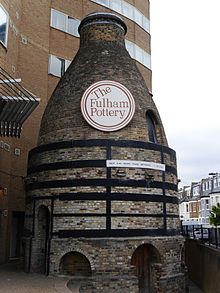

The Fulham Pottery was founded in Fulham, London, by John Dwight in 1672, at the junction of New King's Road and Burlington Road, Fulham, not far from Putney Bridge.[1] Dwight is the earliest clearly documented maker of stoneware in England,[2] although immigrant Dutch or German potters were probably active several decades before. By 1690 there was a rival stoneware operation in Fulham, run by the Dutch Elers brothers, who after a few years went off to become important early figures in transforming the Staffordshire pottery industry.[3]
In its first years it was a pioneering force in English pottery in several respects, in particular salt-glazed wares[4] and figures.[5] After Dwight's death in 1703 the pottery made less ambitious stonewares until a revival in the later 19th century. It operated on the same site until 1956,[6] and then until at least the 1980s as a base for studio pottery to be fired. Today, all that remains of the original pottery is one large bottle kiln, "probably 19th-century", which is now a Grade II listed building.[7]
- ^ Bergesen, 71; 23 pieces at the Museum of London, see individual notes
- ^ Bergesen, 71; MoL
- ^ V&A page, "Teapot" by the Elers; Elliot, throughout
- ^ Elliot, 23, 27–28 (conclusion), and preceding
- ^ Wood, 84, & the V&A pages on their examples
- ^ Wood, 84; Bergesen, 71
- ^ Historic England. "Bottle Kiln at Fulham Pottery (1079795)". National Heritage List for England. Retrieved 28 September 2016.